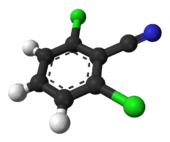2,6-Dichlorobenzonitrile
 | |
 | |
| Names | |
|---|---|
| IUPAC name
2,6-Dichlorobenzonitrile | |
| Other names
Dichlobanil, Dichlobenil | |
| Identifiers | |
| 1194-65-6 | |
| ChEBI | CHEBI:943 |
| ChemSpider | 2923 |
| |
| Jmol-3D images | Image |
| KEGG | C11040 |
| PubChem | 3031 |
| |
| UNII | N42NR4196R |
| Properties | |
| C7H3Cl2N | |
| Molar mass | 172.01 g/mol |
| Appearance | white crystalline powder |
| Density | 1.623 g/cm3 |
| Melting point | 144.5 °C (292.1 °F; 417.6 K) |
| Boiling point | 279 °C (534 °F; 552 K) |
| insoluble | |
| Hazards | |
| Flash point | 126 °C (259 °F; 399 K) |
| Except where noted otherwise, data is given for materials in their standard state (at 25 °C (77 °F), 100 kPa) | |
| | |
| Infobox references | |
2,6-Dichlorobenzonitrile (DCBN or dichlobenil) is an herbicide[1] and is slightly toxic for humans.[2] It is metabolized in the liver by the enzyme CYP2A6.
It was discovered in the mid 50s. It has herbicidal properties killing young seedlings of both monocot and dicot species.[3]
References
- ↑ Hepatic cytochrome P450 enzymes do not play a role in the nasal
- ↑ http://www.epa.gov/oppsrrd1/REDs/factsheets/0263fact.pdf
- ↑ Principles of weed science
| ||||||||||||||||||||||||||||||||||||||||||